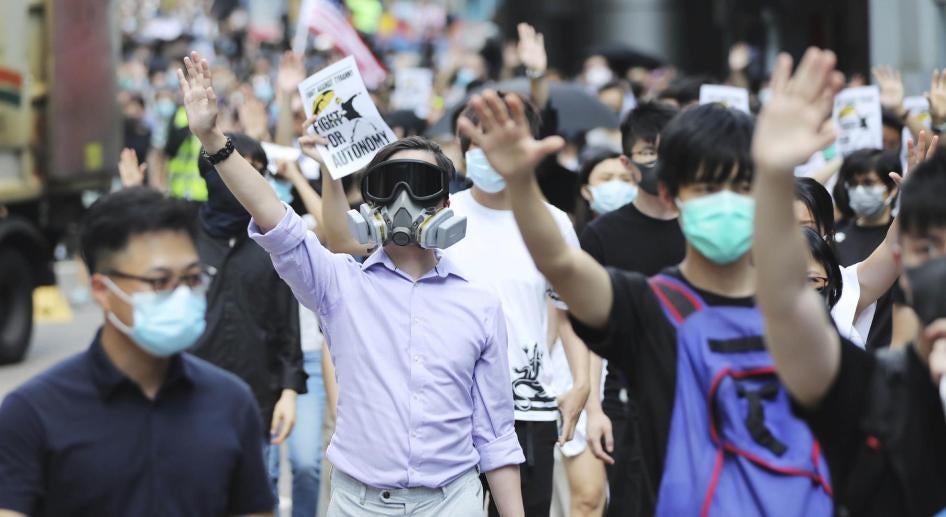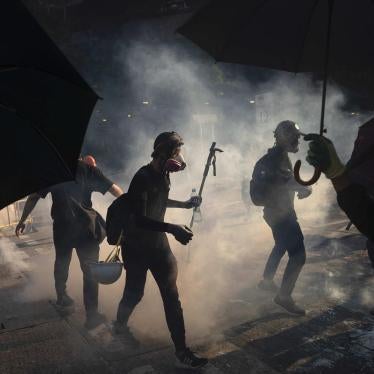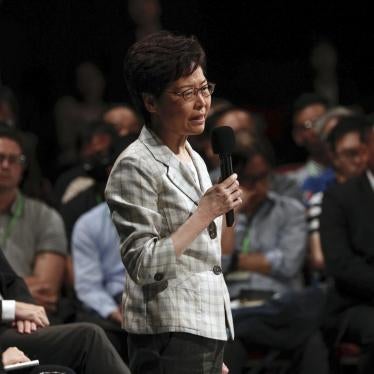(New York) – The Hong Kong government’s broad ban on protesters wearing face masks is a disproportionate restriction on peaceful assembly rights, Human Rights Watch said today. Chief Executive Carrie Lam said the government had invoked emergency powers “to de-escalate the situation and to end the violence.”
The ban on face masks is limited neither by scope nor duration and should immediately be revoked.
“The broad face mask ban seems aimed to discourage protests, not to serve a necessary law enforcement function,” said Maya Wang, senior China researcher at Human Rights Watch. “Hong Kong authorities should be upholding rights, not undermining them.”
The Emergency Regulations Ordinance empowers Hong Kong’s chief executive to enact new laws “in the public interest,” ranging from suspending publications to ordering deportations. The ordinance was enacted in 1922 and last invoked in 1967 by the British colonial government to quell violent protests that led to the deaths of 51 people.
The ban on face masks outlaws any face covering that obscures a person’s identity in public assemblies and marches, regardless of whether those gatherings are lawful. The ban exempts those who need to wear masks for “employment,” “religious,” or “health” reasons. The order apparently bans gas masks, which many protesters have worn to protect themselves from the routine use of teargas by the police against even peaceful demonstrations.
Violators of the ban face up to one year in prison and fines of HK$25,000 (US$3,190). The ban also empowers the police to request anyone to remove their face covering, and those who refuse to do so are liable for up to six months in prison and a HK$10,000 (US$1,280) fine. The ban is effective as of midnight October 5, 2019. Lam said the ban will “create a deterrent effect against masked violent protesters and rioters, and will assist the police in its law enforcement.”
The Hong Kong Education Bureau sent a letter to all schools saying that all students, teachers, and staff should “in principle” not use face coverings in or outside schools.
Under the International Covenant on Civil and Political Rights (ICCPR), which was incorporated into Hong Kong’s legal framework via its Basic Law, restrictions on fundamental freedoms, including freedom of assembly, must be provided by law, “necessary” to achieve a legitimate interest, and proportional to the aim they are designed to achieve. According to the United Nations Human Rights Committee, the independent expert body that monitors compliance with the ICCPR, “restrictive measures must conform to the principle of proportionality; they must be appropriate to achieve their protective function; they must be the least intrusive instrument amongst those which might achieve their protective function; they must be proportionate to the interest to be protected.”
Protests in Hong Kong are already subjected to excessive restrictions under the Public Order Ordinance, which requires organizers of protests and assemblies to obtain a letter of no objection from police. This requirement conflicts with Hong Kong’s obligations under international human rights law. The Human Rights Committee has repeatedly expressed concerns that the ordinance “may facilitate excessive restriction” on the right to peaceful assembly.
Hong Kong authorities have rejected at least 17 applications for protests since July. Protesters’ concerns about reprisals for participation in marches, particularly as authorities have arrested people for “unlawful assemblies” and as some companies have fired employees for participating in protests, has prompted many to wear face masks.
The invocation of emergency powers comes after 17 weeks of largely peaceful protests. The protests, which initially started as opposition to legal amendments that would allow suspects to be extradited from Hong Kong to China, have evolved into an open opposition movement against the Chinese Communist Party’s encroachment on the territory’s freedoms. Hong Kong authorities have been unwilling to establish an independent investigation into excessive use of police force during the protests, to resume progress towards universal suffrage, or to systematically engage peaceful protesters to discuss their concerns. The decision to further restrict protests while not responding to popular concerns could further exacerbate tensions.
“The face mask ban suggests that the government is willing to go even further to violate rights to quell the protests,” Wang said. “Concerned governments should be speaking out about this new restriction on fundamental freedoms in Hong Kong or expect to see even more draconian measures in the future.”








